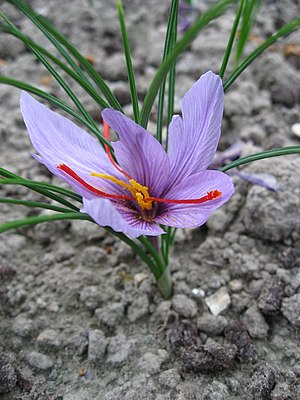Note: This is a project under development. The articles on this wiki are just being initiated and broadly incomplete. You can Help creating new pages.
Difference between revisions of "Crocus sativus - Kesara"
(→References) |
(→Leaf) |
||
| (5 intermediate revisions by the same user not shown) | |||
| Line 1: | Line 1: | ||
[[File:Crocus sativus 02 by Line1.JPG|thumb|right|''Kesara'', ''Crocus sativus'']] | [[File:Crocus sativus 02 by Line1.JPG|thumb|right|''Kesara'', ''Crocus sativus'']] | ||
| − | ''' | + | '''Crocus sativus''' is one of the most expensive spices by weight. The delicate red stigmas have been traded for centuries. Iran is the highest producer of saffron today. |
| − | |||
==Uses== | ==Uses== | ||
{{Uses|Improves skin complexion}}, {{Uses|Impotency}}, {{Uses|Wound healing}}<ref name="Uses"/> | {{Uses|Improves skin complexion}}, {{Uses|Impotency}}, {{Uses|Wound healing}}<ref name="Uses"/> | ||
| Line 9: | Line 8: | ||
==Chemical Composition== | ==Chemical Composition== | ||
| − | Saffron contains a volatile oil composed of terpenes, terpene alcohols and esters. The herb also contains crocin, picrocrocin, crocetin, carotenoids and riboflavin and thiamine. <ref name="Chemical composition"/> | + | Saffron contains a volatile oil composed of terpenes, terpene alcohols and esters. The herb also contains crocin, picrocrocin, crocetin, carotenoids and riboflavin and thiamine.<ref name="Chemical composition"/> |
==Common names== | ==Common names== | ||
| − | {{Common names|kn= | + | {{Common names|kn=Kaesari, Kumkuma kaesari|ml=Kesaram, Kunkumam, Kunkumappu|sa=Agnishikha, Aruna, Asra, Asrika, Kashmiraja, Kashmirajanma, Kasmira, Kaisara, Rudhirakumkuma|ta=Kunkumappu, Kacimiram, Kasmiram|te=Kunkuma-puvva, Kunkumamu|hi=Kesar, Saphran, Zaffran|en=Saffron}} |
<ref name="Common names"/> | <ref name="Common names"/> | ||
| Line 36: | Line 35: | ||
==Identification== | ==Identification== | ||
===Leaf=== | ===Leaf=== | ||
| − | {{Leaf||| | + | {{Leaf|||}} |
===Flower=== | ===Flower=== | ||
| Line 73: | Line 72: | ||
File:Crocus sativus leaves 01.jpg|Leaves | File:Crocus sativus leaves 01.jpg|Leaves | ||
File:Crocus sativus, illness (35).jpg|Corm | File:Crocus sativus, illness (35).jpg|Corm | ||
| − | + | ||
</gallery> | </gallery> | ||
| Line 89: | Line 88: | ||
[[Category:Herbs]] | [[Category:Herbs]] | ||
[[Category:Iridaceae]] | [[Category:Iridaceae]] | ||
| + | [[Category:Pages without herbs images]] | ||
Latest revision as of 15:35, 20 April 2020
Crocus sativus is one of the most expensive spices by weight. The delicate red stigmas have been traded for centuries. Iran is the highest producer of saffron today.
Contents
- 1 Uses
- 2 Parts Used
- 3 Chemical Composition
- 4 Common names
- 5 Properties
- 6 Habit
- 7 Identification
- 8 List of Ayurvedic medicine in which the herb is used
- 9 Where to get the saplings
- 10 Mode of Propagation
- 11 How to plant/cultivate
- 12 Commonly seen growing in areas
- 13 Photo Gallery
- 14 References
- 15 External Links
Uses
Improves skin complexion, Impotency, Wound healing[1]
Parts Used
Chemical Composition
Saffron contains a volatile oil composed of terpenes, terpene alcohols and esters. The herb also contains crocin, picrocrocin, crocetin, carotenoids and riboflavin and thiamine.[2]
Common names
| Language | Common name |
|---|---|
| Kannada | Kaesari, Kumkuma kaesari |
| Hindi | Kesar, Saphran, Zaffran |
| Malayalam | Kesaram, Kunkumam, Kunkumappu |
| Tamil | Kunkumappu, Kacimiram, Kasmiram |
| Telugu | Kunkuma-puvva, Kunkumamu |
| Marathi | NA |
| Gujarathi | NA |
| Punjabi | NA |
| Kashmiri | NA |
| Sanskrit | Agnishikha, Aruna, Asra, Asrika, Kashmiraja, Kashmirajanma, Kasmira, Kaisara, Rudhirakumkuma |
| English | Saffron |
Properties
Reference: Dravya - Substance, Rasa - Taste, Guna - Qualities, Veerya - Potency, Vipaka - Post-digesion effect, Karma - Pharmacological activity, Prabhava - Therepeutics.
Dravya
Rasa
Tikta (Bitter), Katu (Pungent)
Guna
Snigdha (Slimy)
Veerya
Ushna (Hot)
Vipaka
Katu (Pungent)
Karma
Pitta, Kapha, Vata
Prabhava
Habit
Identification
Leaf
| Kind | Shape | Feature |
|---|---|---|
Flower
| Type | Size | Color and composition | Stamen | More information |
|---|---|---|---|---|
Fruit
| Type | Size | Mass | Appearance | Seeds | More information |
|---|---|---|---|---|---|
| {{{6}}} |
Other features
List of Ayurvedic medicine in which the herb is used
Where to get the saplings
Mode of Propagation
How to plant/cultivate
Season to grow
Soil type
Propagation
Commonly seen growing in areas
Sub tropical area, Temperate area
Photo Gallery
References
External Links
- Ayurvedic Herbs known to be helpful to treat Improves skin complexion
- Ayurvedic Herbs known to be helpful to treat Impotency
- Ayurvedic Herbs known to be helpful to treat Wound healing
- Herbs with Stigma used in medicine
- Herbs with common name in Kannada
- Herbs with common name in Hindi
- Herbs with common name in Malayalam
- Herbs with common name in Tamil
- Herbs with common name in Telugu
- Herbs with common name in Sanskrit
- Herbs with common name in English
- Habit - Herb
- Index of Plants which can be propagated by Seeds
- Herbs that are commonly seen in the region of Sub tropical area
- Herbs that are commonly seen in the region of Temperate area
- Herbs
- Iridaceae
- Pages without herbs images





